Wonders Onyango Oloo
THIRD DRAFT (the beauty of digital essays is that they are like rivers;you never read the same digital essay twice! there is always something to improve, change and modify)
-I-
”We will defeat it at the referendum. We are able to mobilize the Kenyan people through running a massive parallel civic education programme beginning August. Once we educate the people on the shortfalls of the draft, then they will be in a position to vote wisely."
-Ngang'a Thiongo, Kenya Human Rights Lawyer and Chairperson of

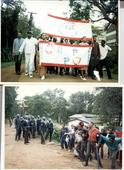
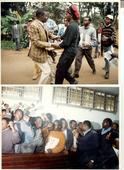
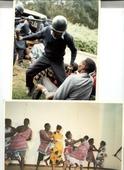
Release Political Prisoners
”The government is bulldozing its way because it is looking at the next general election:it is all about Kibaki's succession. They may not be very sure if they will win the next election, but in the event they do...the issue of a powerful president will favour them.”

Dr. Mutahi Ngunyi, Kenyan political scientist and commentator, quoted by Joyce Mulama in her Inter Press Service dispatch, Monday, July 25, 2005
*********************************************
-II-
My essay today is about the upcoming Kenyan constitutional referendum in November 2005.
However, I would be completely remiss, as the late
.jpg)
Dr. Johnnie Cochran was wont to say, if I did not extend my revolutionary greetings and message of internationalist solidarity to the Cuban people as they celebrate the 52nd anniversary of the storming of the Moncada Barracks, one of the biggest dates on that Caribbean island nation's calendar. To get a first person, eye-witness account of that historic act, please read
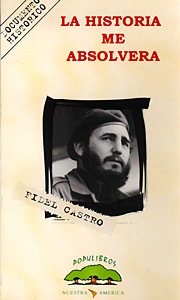
Fidel Castro's famous La Historia me absolverá

passionate address to the court when he defended himself vigorously and quite ably (after all, he was a well known Havana lawyer himself) in a treason case after being captured by the Batista forces.
Cuba is observing this national day against the backdrop of the devastation of Hurricane Dennis which left tens dead, scores injured and hundreds of dwellings destroyed along its swathe of devastation. News is strickling in that a peace caravan from the US carrying goods for Cuba has finally entered Mexico after being held up by the American government. In other news, the
Cuban News Agency is reporting that the detainees on Guantamo Bay are on a hunger strike to protest their deplorable conditions and
the BBC is telling us that a US judge has denied bail for the accused terrorist suspect

Luis Posada Carriles, a former CIA operative and militant anti-Castro Cuban exile wanted by both Venezuela and Cuba for bombing a Venezuela passenger plane in 1976 which left 77 people dead and organizing a series of terrorist bombings of Havana hotels in 1997. He is seeking political asylum in the United States. Meanwhile, the Cuban Vice President and Speaker of the National Assembly

Ricardo Alarcón has penned an op-ed carried by the radical US online newsletter Counterpunch on the UN, the US and the Miami 5.
*********************************************
-III-
After that brief detour of a prologue, let me stroll back slowly to the home front and the subject at hand.
If there is one Kenyan politician we associate with the Kilifi Draft, it is none other than the Nyaribari-Chache MP, FORD-People leader and Energy minister

Jaduong' Nyachae bin Nyandusi.
He has been in the

iris
of

of the eye of the storm, thwacked as a "quisling"; walloped as an MKM minion and drubbed as a anti-Wanjiku backsliding Bomas backstabbing adui.
Well, the former head of the civil service and secretary to the cabinet is not exactly bashful when it comes to speaking his mind.
In today's Standard newspaper(Tuesday, July 26, 2005) he swats back with an incendiary opinion piece in the Commentaries section of that Nairobi daily. Simeon Nyachae takes no prisoners as you can see from this short blistering excerpt:
"Kenyans have witnessed the highest level of political dishonesty, brinkmanship, selfishness and ethnic chauvinism in the process of reviewing the constitution. However, after all the struggles, pushing and shoving, we now have a constitution that will serve Kenyans through the next important phases of enhancing democracy in our country. The new constitution will protect fundamental rights, ensure a very sensible counterbalance of all the three arms of government; the executive, the judiciary and the legislature and ensure that Kenya is a modern state governed by the rule of law..."
I found the above comments intriguing- largely because they describe Nyachae's own recent and ongoing political conduct, character and motivations especially around the


Sun 'N Sand frolicking conception of the disastrous Kilifi Draft to a perfect T.
Is this really the same guy who was blasting Kibaki and the NARC government for having failed the Kenyan people on the issue of the Katiba not too long ago? Is this the person who decided to sneak huskily into bed with Kibaki without consulting his own Secretary General? Is this the same person who heads a parliamentary caucus that has 14 out 15 elected representatives springing from one ethnic group and follow a very ethnic agenda? Is this the same Nyachae who stubbornly shunned attempts to draw him into a national coalition of Kenyan democratic forces against KANU-thus ensuring that he not only lost his presidential bid but further, consigned himself to lording over a small sub-regional rump of an electoral machine? And speaking of political dishonesty, is Simeon Nyachae not the same politician who unceremoniously ditched his erstwhile Coalition for National Unity partner(read Uhuru Kenyatta and KANU) to jump at the chance of replanting a ministerial flag on his limousine? One of the definitions of the word "brinkmanship" is "n : the policy of pushing a dangerous situation to the brink of disaster (to the limits of safety)". Does the mutilation of the Bomas Draft, the subsequent brutal suppression of the protests against that mutilation and the open deceit, bribery, coercion and subterfuge that characterized the despicable abortion of a "debate" on the same atrocious document qualify as "brinkmanship" as in bringing Kenya and Kenyans right to the precipice of a looming national conflagration? Is Mzee Nyachae at all implicated in that brinkmanship? I certainly think he is. If we examine the second sentence on the Nyachae excerpt above, I would like to ask the Energy minister if he really seriously and sincerely believes that the "Kilifi Draft"-or any of its hideous relatives- will really protect fundamental rights- when those fundamental rights were abused by state connected officials intent on the passage of the same said illegal draft; whether this deformity of a constitution will really "counterbalance" the three arms of government when in actuality the NAK side was crowing with smugness because they had succeeded in bulldozing parliament to denude itself of strength while boosting the already daunting powers of the imperial presidency. How could Kenya ever hope to be a "modern state governed by law" when the government of the day sends uniformed goons to crack the skulls of the electorate whose human rights they are professionally duty bound to protect?
People...




Hello????
Wananchi, there are these stacks of yellowing Kenyan newspapers that are stashed away in the various shelves of assorted cyberarchives. At this point, I want to reach out and retrieve a dog eared copy of the Daily Nation of the 18th of December 2003. Can we read the following lines together:
"..Yesterday Mr Nyachae and Mr Kenyatta said they were putting aside their personal and political ambitions to unite and provide a permanent challenge to the government.
Mr Nyachae said the coalition would not limit its role to asking questions in Parliament but would advocate policy changes.
"We must turn away from the path of hatred and divisive politics and walk on the path of progress, focusing more on the things that unite us rather than on narrow and petty differences between us," he said.
The coalition will not hold elections until a constitution is drafted and adopted by both parties by June 2004.
It will be run by a national steering council, chaired by Mr Nyachae, a joint parliamentary group, led by Mr Kenyatta, and a national secretariat.
Part of its mission is to "coalesce forces in the two parties and thereby develop formidable approach to national politics with a view to being elected into government at the next general elections."
Mr Nyachae and Mr Kenyatta accused the Narc government of failing to deliver its elections promises and cited increased insecurity, the troubled Constitutional review process and the party's pledge to create 500,000 jobs annually.
Said Mr Nyachae: "Kenya is more important than all of us. We have resolved to work together to boost legislative politics in Kenya and develop sustained approach to matters of national unity."
The Nyaribari Chache MP pledged his personal support for the coalition and to give it the benefit of his experience."
So, our principled politician Mr. Simeon Nyachae, the one and only one who had accused NARC of failing to deliver its elections promises felt that the most effective way to "provide a permanent challenge to the government" was to sneak behind your party officials like Oliver Seki and Mwandawiro Mghanga and the electorate who had sent you to Bunge as an opposition party, sneak past them in the middle of the night to accept ministerial positions in the very same government?
That is monkeyshine.
But wait, there is more.
Let us now take a look at the Kenya Times, published
on the same day, December 18, 2003:
"...Ford-People Simeon Nyachae decried the domination of governance by only a few people at the expense of the national constituency, and promised that the CNU will make the government more collaborative and less exclusive. He said that Kenyans were growing poorer under the NARC government than previously, singling the escalating domestic debt as a major sign of economic stagnation. Hon. Nyachae criticised continued looting of state coffers by officials of the new government, saying that like the previous government, NARC still misuses state vehicles, helicopters and civil servants..."
What does Uhuru Kenyatta think of Simeon Nyachae these days?
A reliable, trustworthy and stable political ally?
C'mon. Let's be serious.
Three months and six days before announcing that fearsome "Coalition of National Unity" the Fantastic Opposition Duo had called a press conference that was convered by the Daily Nation:
News
Saturday, September 13, 2003
Now Uhuru-Nyachae team tears into Narc
By DAVID MUGONYI
Two opposition parties yesterday teamed up to issue a joint challenge to the Narc Government.
They called a press conference at the Bomas of Kenya, addressed in turns by Official Opposition leader Uhuru Kenyatta of Kanu and Ford People's Simeon Nyachae, and accused the Government of attempting to derail the constitutional review conference.
The statement, coming just a day after ex-President Daniel arap Moi formally relinquished his last remaining political office as Chairman of Kanu, lends greater credence to speculation over the last few weeks that the two parties were working to craft a formal opposition alliance.
Kanu is the dominant Opposition party with 67 MPs while Ford People has 15.
Other minor Opposition parties share five seats, two each for Safina and Sisi Kwa Sisi and one for Shirikisho.
That gives a combined number of 87 Opposition MPs, falling far short of the 135 seats held by Narc.
It would also be taken into consideration that the five minor-party MPs tend to side with Narc, as do about five of the Kanu MPs from the greater Kiambu region in Central province.
But there is also the fact that a sizeable grouping of the Narc contingent in Parliament loyal to the Liberal Democratic Party has been threatening rebellion over the prime minister issue.
Accompanied by 20 MPs, 16 from Kanu and four from Ford People, the two opposition leaders accused Narc of reneging on a pre-election pledge to deliver a new constitution within 100 days of taking office.
They decried what they called attempts to misdirect, scuttle and delay Bomas II. "If power is so sweet and corrupting, Kenyans must remain firm that this review be completed as soon as practicable," they said. "We shall not allow continued play of power games at the expense of the tax payers – our country is more important and greater than any one of us," they added.
The Kanu and Ford People leaders said wrangles within the ruling coalition had been imported into the National Constitutional Conference and were frustrating the talks.
"It is evident that Narc in power is behaving differently from the Narc that was in the Opposition, which received overwhelming goodwill and support from the voters," their statement said.
Can you say flip flopping

political eel spinning, writhing, slithering and twisting this way and that way?
Try it. I know you can-it is far from being a tricky tendril-like tongue twister entangling you in its tantalizing tentacles.



Tosa gari. Kaa Skweya.Kaa Bosote. Kaa Ritho.Opatia Mimi Otonglo Yote.Dereva Piga Moto. Chomoa Gari! Enuff Sed.
******************************
-IV-
What on Earth is a Referendum?
A referendum (plural: referendums or referenda) or plebiscite is a direct vote in which an entire electorate is asked to either accept or reject a particular proposal. This may be the adoption of a new constitution, a constitutional amendment, a law, the recall of an elected official or simply a specific government policy. Certain kinds of referenda held in some states of the United States are referred to as ballot measures or propositions. The referendum or plebiscite is a form of direct democracy....Referendums may be either binding or non-binding. A non-binding referendum is merely consultative or advisory. It is left to the government or legislature to interpret the results of a non-binding referendum and it may even choose to ignore them. Nonetheless, actual political circumstances in countries that hold non-binding referendums are such that the results of such a referendum are usually honoured. In contrast, a number of nations permit binding referendums in which the result is legally enforceable.
A foundational referendum or plebiscite may be drafted by a constituent assembly before being put to voters. In other circumstances a referendum is usually initiated either by a legislature or by citizens themselves by means of a petition. The process of initiating a referendum by petition is known as the popular or citizen's initiative. In the United States the term referendum is often reserved for a direct vote initiated by a legislature while a vote originating in a petition of citizens is referred to as an "initiative," "ballot measure" or "proposition."
In countries in which a referendum must be initiated by parliament it is sometimes mandatory to hold a binding referendum on certain proposals, such as constitutional amendments. In countries, such as the United Kingdom, in which referendums are neither mandatory nor binding there may, nonetheless, exist an unwritten convention that certain important constitutional changes will be put to a referendum and that the result will be respected.
In most referendums it is sufficient for a measure to be approved by a simple majority of voters in order for it to be carried. However a referendum may also require the support of a super-majority, such as two-thirds of votes cast. In Lithuania certain proposals must be endorsed by a three-quarters majority.
In some countries there is also a requirement that there be a certain minimum turn-out of the electorate in order for the result of a referendum to be considered valid. This is intended to ensure that the result is representative of the will of the electorate and is analogous to the quorum required in a committee or legislature. An alternative is to insist on a certain minimum absolute number of yes votes before a measure can be deemed to have been carried—or of no votes if it is to be deemed vetoed.- from
Wikipedia
One thing I can tell you right away:
My current domicile almost automatically "qualifies" me as an "expert" on referenda- or "ums" if you prefer the alternative spelling.
Why?
Well, I live in Quebec, and that is ALL we ever talk about.
At least that is what some people in what they call "the rest of Canada" imagine we think about.
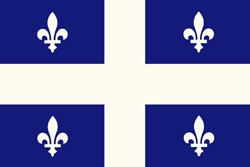


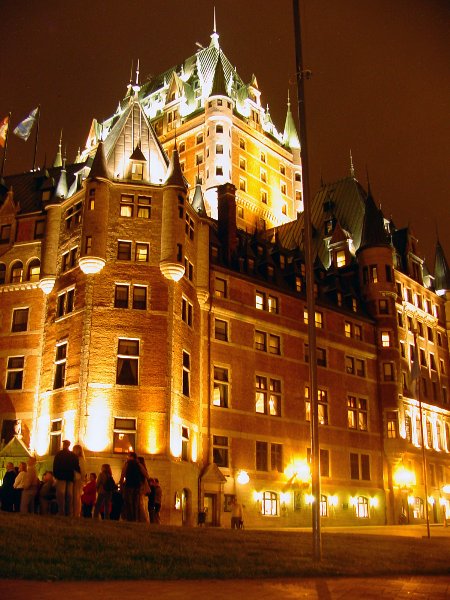

Quebec, as you many of you know, is a storied region that has been struggling for regional autonomy within the context of the Canadian monopoly capitalist state. Depending on whether you are talking to a federalist or a sovereignist, Quebec either hankers to be recognized as a "distinct society" or accepted as a completely new, independent French speaking nation in North America. This central issue has been at the centre of politics in Quebec for generations. In 1970, it even sparked off a short-lived urban guerrilla skirmish between the RCMP and the FLQ- with lingering bitterness on both sides to this day. The fact that the Federal Prime Minister who ordered troops to quell the "disturbances" was a Quebecer and a Montrealer to boot(the late venerated Liberal leader

Pierre Elliott Trudeau did not act as oil smoothing those troubled waters of La Belle Province where

General De Gaulle famously declaimed "Vive le Québec libre!" from the balcony of the city hall near the Old Port right here in Montreal on the 24th of July, 1967)
In the last twenty five years we have had TWO referenda in Quebec, one in 1980 and the other one in 1995- and the sovereignists(pejoratively scorned by rah rah Anglo-Canadian nationalists as so called "separatists") lost on both occasions. Here is a
link to a guide to last one...
As a succession of sovereignist Parti Quebecois(PQ) and Bloc Quebecois (BQ) leaders like

Rene Levesque

Lucien Bouchard

Jacques Parizeau
and

Gilles Duceppe (shown here with Cameroon-born actor and Bloc Quebecois MP Maka Kotto)
could ruefully and grudgingly acknowledge if you broached the subject with them, that having a Winning Strategy for a Referendum is not something one wants to shake a stick at...
*****************************************
-V-
WHO Will Win the Referendum in November?
Now

Ndugu Ahmed Slatch, Harun Ndubi,Ngang'a Thiong'o, Wahu Kaara Oduor Ongwen, Mwandawiro Mghanga, Koitamet ole Kina, Kepta Ombati, Orina Nyamwamu, Patrick Ouma Onyango, Bishop Stephen Muketha, Michael Gitahi Ngunyi, Boaz Waruku, Rebecca Mbithe Kitana, Catherine Wairimu, Samson Ojiayo Owimba,Rone Achoki, Monica Amolo, Paul Angwenyi, John Indimuli, Henry Maina, James Maina and all the other sisters and brothers standing up against the obscentity unleashed on the Kenyan people by Kiraitu and his cohorts:
I have seen the fierce, passionate optimism with which you declare victory for the Wanjiku side come November.
Over here in Canada, Adongo Ogony, myself and many, many, many,other patriots in the USA, the UK, Sweden and other parts of ughaibuni share the same vim, the vigour, the same determination.
But wait a minute.
Just a sec.
Let me get something...
You see it is this

Ndoo
I am going to

fill it to the brim with
COLD Water that I would like to pour on your faces, just like

this Chinese brother is doing...
Why?
To give all of us the jolt of a much needed REALITY CHECK.
And what is that reality check?
It is that given the current trend of things, the Kiraitu led NAK forces with their bag of undemocratic tricks and backed by the state machinery and its heavy battery of organized propaganda, coercion and hegemonic clout, are in fact, in my opinion, going to most certainly, if we are complacent and not careful, go ahead and wring a "victory" from the jaws of supposed defeat to recycle a cliche for the 25th billionth time, they will emerge "triumphant" using the same, same methods they used to "win" in parliament last Thursday. It is not actually a given, a foregone conclusion, that we, the forces who make up the foes of the "Kilifi Draft" have the upper hand-quite the contrary. If a London bookie were to open odds on us cruising past the referendum battle, our prospects would be listed as a very,very long shot.
My argument is that the Kilifi Draft Posse as I call them, has a number of pinda na mishale, mikuki na ngao, bastola na vipanga in their arsenal:
Since the DP-NAK contingent have the Imperial Presidency, they also control all the coercive and repressive instruments of the state including the Armed Forces, the Police, the Prisons, the Intelligence Services and so on;
Since the 2003 Purge of the Judiciary, they control, largely the judges and magistrates;
From last Thursday's parliamentary vote, we know they can BUY many, many members of the Kenyan National Assembly; Do not be surprised if some of the wishy-washy MPs who voted against the government, change their vote, their stance and their turf come November. It is a snake pit full of vipers and cobras, that Bunge is...
They not only control the Presidential Press Service, Kenya News Agency and the Kenya Broadcasting Corporation- in addition, the country's largest English and Kiswahili dailies and weeklies (from the Nation Group stable) are in their stable hands; if you throw in some of the ethnic FM stations and other media outlets linked to NAK friendly faith-based groups;
And speaking of faith based groups- many of the significant leaders of the dominant Christian denominations are firmly tucked away in their back pockets. Some of them-like

Mutava Musyimi and

Ndingi Mwana a'Nzeki should be expected to be full time campaigners for the Kilifi Draft-using the pulpits and the government friendly media organs.
It is NOT a given that ALL, or even MOST civil society formations, especially the civic education outlets, will AUTOMATICALLY go to bat for the anti-Kilif Draft side. The stakes are high for some of these civil society organs- others have been fronts all along for the Kibakites and some may want to sit on the fence or act "pragmatically" which is practically the same thing- sitting on their hands doing nothing to sway their clients and social base to strike a blow for democracy in Kenya.
With Mwiraria clutching the keys to the Treasury, you can be sure that NAK will try some icky, shady financial miujiza to siphon muthendi from state coffers to bolster the DP-NAK war chest. It is at this time that we will see the constitutional implications of Anglo Fleecing, De La Ruegate and other scandals of grand graft and grand theft manifesting themselves in the form of cabinet ministers all of a sudden having tons and tons and tons of ngiris & jirongos to throw at idle youth, hungry peasants, unemployed workers, financially indebted dukawallahs and other small business-people and of course as always- the usual suspects- mawaziri wengine,wabunge, madiwani, machifu, masabchifu, mapisi madisi madio na wakubwa wengine serikalini na madarakani... If you think that "money was poured" last week, wait until you see the November financial floods all over the country. I swear I heard sixteen readers smacking their lips and rubbing their fingers in anticipatory glee!
And yes, Kenya's very own homegrown Interhamwe thugs are waiting in the wings all over the country. For instance, Foreign Minister Ali Mwakwere's military brother was fingered as the commander of those Digo youth being trained furtively in the Kaya forests. All over a sudden all is quiet on that front. Where are these youths and what are they doing? How about Mungiki? How about all those ethnic "tribal warriors" all over the country from the Rift Valley to Western to Nyanza to wherever? Who is controlling them. Some of them do not have a cause; they are mercenaries and will work for the person who pays them most. Is a bloody carnage being plotted by some of the forces with an interest in the outcome of the November contest?
How about the donors?
Very simply they will support the side that is likely to guarantee their geo-political stability. They do not care one way or another- these are just a bunch of Africans going at each other.
Even the CHAIR of the CKRC itself,

Ms. Abida Aroni has already said she will be rooting for the Kilifi Draft. And we know she is NOT a lone voice in that commission.
So folks, this is what we are up against.
Do we simply give up?
Now that would be stupid wouldn't it?
Do we boycott the process if we see the DP-NAK side has injected too many shady things?
I would caution against that.
Boycotts are probably what the other side is hoping would happen so that they go ahead with a dubious referendum and declare themselves the winners anyways.
Regarding boycotts, we really should pay attention to what has been happening in Cameroon.
Now I guess all the soccer aficionados may think this is a no-brainer since they follow the professional careers of all those superstars:



Folks, even though I am a mshabiki wa kandanda, I am NOT talking about FOOTBALL!
Instead, Wananchi wenzangu, I invite you to take a look at this political overview of contemporary Cameroon:
B. Centralization and Personalization of Power
President Amadou Ahidjo continued to centralize power in the Federation. In 1972, Ahidjo abolished the United Federal Republic of Cameroon that was put in place after reunification, and in its place established a centralized, unitary state. He divided the country into ten provinces--eight Francophone and two Anglophone (the Northwest and Southwest Provinces). 63 He claimed that the unitary system was necessary because Cameroon was such a small country, and therefore could not afford the expense of maintaining a "complex and cumbersome system of three separate governments and assemblies." 64
Power was increasingly centralized in the hands of the President, while the position of Vice-President as well as West Cameroon's separate Assembly and House of Chiefs were abolished. 65 These actions, along with a growing brutal repression of any group in opposition to Ahidjo, further confirmed Anglophone suspicions that they would be marginalized in this new system. Ahidjo used force to try to unify "two different countries, two different cultures, two different economies." 66 The abolition of the federal system created the basis for future Anglophone claims of marginalization and exploitation.
In 1982, Ahidjo hand-picked his successor, Paul Biya. Many had hoped that Biya would push the country further along the democratic path. Although Cameroon became a multiparty democracy in 1990, this transition, like many other African transitions, was in name only. Biya carved up the North into three administrative provinces (Adamawa, North, and Far North) to undermine the power of the Muslim leaders in the North. 67 Biya started out with a democratic agenda, but following the bloody 1984 coup attempt, began to centralize and personalize power even more than Ahidjo. 68 Beti and Bulu ethnic groups (from Biya's region) began to dominate government and parastatal organizations.
Repression was justified in the name of national unity, political and economic stability, and the security of the state. Many citizens were willing to forgo their short-term individual liberty for the sake of economic development and national unity. 69 Under President Biya, the National [End Page 164] Assembly became a rubber stamp, and the judiciary became corrupt, inefficient, and far from independent. 70 For example, the President is the head of the Supreme Command of Magistrates and signs promotions, transfers, and the like. This has helped to undermine the rule of law and promote the personal/patrimonial rule of Paul Biya. As Gabriel argues, "Both Ahidjo and Biya practiced presidentialism, built up an excessive clientelistic network to control a highly diverse country, and in order to obtain the loyalty of their clients, engaged in a massive redistribution of state resources." 71 Co-optation of potential and real opposition forces was the crowning achievement of Biya and the CPDM.
The CPDM has remained an important actor in Biya's personal/patrimonial rule, remaining in power since Biya took over in 1982, creating a virtual one-party state. Opposition parties were only legalized in 1990 following widespread riots, many concentrated in Bamenda, Northwest Province. There are now some 150 political parties operating legally, but only three main opposition parties: the Social Democratic Front (SDF), the Union Nationale pour la Democratie et le Progres (UNDP), and the Union des Populations du Cameroun (UPC). 72
C. Co-optation
Until 1992, elections were simply a formality, with the CPDM and Biya assured of victory. Multiparty presidential elections were held in 1992 and 1997 with legislative elections in 1997. 73 Biya and the CPDM remained in power, but the elections were widely criticized as fraudulent by both international and domestic observers. 74 The UNDP and a faction of the UPC party joined the CPDM in a coalition government after the 1997 elections. 75
Biya used patronage to win the support of individuals as well as regions, offering plumb ministerial posts to new coalition members and maintaining an alliance between his southern-based tribe and the northern Muslims. 76 [End Page 165] Biya also used patronage and key appointments to divide the Anglophone opposition. In 1997, Biya appointed Peter Musoke, an Anglophone elite from the Southwest Province, Prime Minister. Musoke replaced Simon Achidi Achu, an Anglophone elite from the Northwest Province. 77 This appointment created greater Southwest Anglophone loyalty to the CPDM and further widened the gulf between the Southwest and Northwest province Anglophones. As Eyoh argues, "cleavages between regional factions of the Anglophone elites have been sustained by a state-centered process of elite formation." 78
Biya seems determined to remain in power, either through the use of the stick or carrot (co-optation). In 1996, President Biya had the constitution amended to allow the president to remain in power for seven years. Thus in 2004, Biya can run for another seven year term. If he wins, he will have held power in Cameroon for almost three decades. 79
This centralization and personalization of power has led to the development of the "big-man" syndrome. The man with power (from the President to lower civil servant officials) uses his power as he sees fit, and the population generally looks up to the "man with power" to solve all their problems. The "big man" is thus "above the law." This creates a negative human rights culture where the man with the most power can and does abuse the rights of men (and women) beneath him, because he has the power to do so, and because he makes the argument that it is in the national interest to do so. In other words, when you are the "big man" you don't have to respect the rights of others.
In short, the centralization and personalization of power in Cameroon created a negative human rights culture, whereby the rights of some could be sacrificed for the so-called rights of others. This alienated the Anglophone minority, and undermined the rule of law, further promoting "chop politics." 80
SOURCE.
I am suggesting that there are very eerie parallels with the Kenyan situation that we ignore at our own peril.
The largest opposition group in Cameroon is called the Social Democratic Front. See how they have reacted to the Biya dominance of the state and national politics by clicking
here.
In the October 2004 elections they broke with their policy of boycott- but still deviated from a united front strategy to try and go it alone, with predictable results.
From this link, you can glean more views from a cross section of Cameroonians-the English speaking part- on the whole efficacy of electoral boycotts.
My positon on the upcoming referendum is fairly unsophisticated and can be broken down in the following points:
1. The Kenya democratic forces would be making a fatal mistake if they underestimated the DP-NAK forces capacity to win the next referendum;
2. It is not a given that this is going to be a simplistic US versus Them stand off- there will be a lot of shifting of positions with a few dramatic defections from the Bomas camp;
3.We should not wait until October to put in place a coherent strategy-starting with a solid organization on the ground to get things jump-started pronto.
4. It will take more than a few rallies and street marches to win this thing. We need to win Kenyans hut by hut, gichagi kwa gicagi, estate by estate, union by union, NGO by NGO, district by district, province by province.
5. One of our most important initial victories, that is, if we do not stop this process cold in the courts before it even takes off will be to make sure that a CLEAR UNAMBIGIOUS QUESTION IS ASKED. And not a fake, vague question like, "Do You Think Kenyans Need a New Constitution Now?" or similar tomfoolery. The people should know that this is a referendum between the Bomas Draft and the Kilifi Mockery.
6.We must consolidate our forces. Winning over the media will be crucial. The media is NEVER neutral, so we may as well win them over to our side- MOST Kenyan journalists, editors and columnists are patriotic and democratic minded. We should persuade them to work with us. Remember the state already controls at least three media outlets- KNA, PPS, KBS and unofficially, the NATION group and a couple of FM stations.
7. We must win over international public opinion and the Western donor community. They have seen the images on CNN and the BBC- now is time to appeal to them to apply the appropriate pressure.
8. OUR strategy, even if theirs is different MUST NEVER DEGENERATE to a TRIBAL or REGIONAL witch-hunt. Remember all strongholds whether they are associated with this bloc or the other- are still located firmly in Kenya.
9. Unite the Many to Divide the Few. There is a national consensus from the ground up against the Kilifi Draft. But we must translate this latent force into actual human beings waking up to go and vote FOR OUR SIDE- even it means transporting them to the polling boths in wheel barrows, ngamias and punda milia.
10. Vigilance, vigilance, vigilance against the inevitable penchant for the incumbent to rig should be our watchwords. We must recruit and train our observers and monitors.
11. Let us think about creating Wananchi Self Defence Units because the opposing forces may decide to resort to naked violence to frighten and intimidate our side from showing up.
12. I am sure I missed out on 24 other pointers, so please get to work and fill in the blanks.
I could have written a much longer piece...
Gotta go.
Onyango Oloo,
Montreal




1 comment:
Post Script: Just before I posted the first draft a fellow netter going by the handle "Yatima" posed the following question:
Katiba Before your Digital
From: Yatima To OO - Tue, Jul 26, 2:34 PM
I have asked elsewhere if the current constitution has provisions of dissolving itself. Over a year ago, there were attempts to "embed" the review process by amending Article 47. Somehow nothing was done. It is quite simple to see the resulting document may be challenged based on a legal argument about its legal origin. This is quite disturbing given the fact that it has taken tremendous resources to get here. Swali ni hivi, "Could we have done well with ammendments without all those wastage?". My anwser is in the affirmative. Kenya had an opportunity (MOI's exit) and political will(euphoria) to boot, but squandered it.
The document (the constitution) is likely to never see the light of day. I will quickly add "this may have been the intention all along". So back to square one.
Yatima
Oloo's Response:
This is my own view being a complete novice and lay person when it comes to constitutional law. I would imagine that the very process of developing the Katiba cannot and must not be reduced to a technocratic exercise confined to lawyers, or limited to tinkering now with this part, now with that part of our existing dodo of a constitution. If we look at our Kenyan national experience, one can argue that we have been writing a constitution for one hundred and ten years- the first sixy eight under the orthodox yoke of ukoloni mkongwe and the last forty two groaning under the weight of ukoloni mamboleo. If a constitution represents our supreme document distilling what we Kenyans want and how we want to govern ourselves and relate to our neighbours and find our place in the world as global citizens, then we have already been doing the incremental and evolution thing with our blood, with our sweat, with our struggles over the years- mbaruk al amin mazrui,mwangeka, wanje, me katilili, waiyaki wa hinga,syotuna,moraa wa ngiti,elijah masinde, muindi mbingu, makhan singh, chege kibachia, pranlal seth, jeevanjee, koitalel arap samoei, jean marie seroney, chelagat mutai, jm kariuki, kimaathi wa waciuri, sarah sarai, general bamuinge, oginga odinga, masinde muliro, george kapten, wasonga sijeyo, young kihara, oyangi mbajah, george anyona,ngugi wa thiongo, shadrack guto, kamoji wachiira, micere mugo, alamin mazrui, adongo ogony, martin shikuku etc have all been writing the constitution. the efforts of willy mutunga, murtaza jaffer, gitobu imanyara, charles rubia, masinde muliro, james orengo, mtumishi kathangu, njeri kabebri, erastus wamugo, timothy njoya, raila odinga,edward oyugi, koigi wa wamwere, kivutha kibwana, harun ndubi, mwandawiro mghanga, mwashengu wa mwachofi, katama mkangi, wahome mutahi, silvanus odour, njenga kaberere, john munoru,miguna miguna, plo lumumba, mwakdua wa mwachofi, odindo opiata, karimi nduthu, kangethe mungai, davinder lamba, kathini maloba, tirop arap kitur, wafula buke, ooko ombaka and all those other patriots who participated in ufungamano, safari park, bomas of kenya, uhuru park, kamkunji, muoroto, kisumu, tononoka, nakuru and all over the country have all enrichened our constitutional making experience.
what i am saying in other words is the cumulative effect of our collective national,democratic and patriotic struggles in informing the content and form of our constitutional dispensation. in this context, there is really no price you can put on the blood that has been shed, the sweat that has been spent, the years marching in the streets, declaiming in symposia, poetizing in prison and hunger striking in exile.
it is for this reason that i hold people like my former lawyer kiraitu murungi, mutava musyimi, mirugi kariuki and others who had played such a noble role in an earlier incarnation criminally irresponsible because they are conscious of the historic gains they are trying to reverse; they are conscious of the political victories they are trying to undo; they are conscious of the forward steps they are trying to pull back.
so briefly, yatima, the answer to your question is no, is that there was no "wastage" in the sense you refer to it- even we are aware that for some bomas delegates and others, and they are not many- it was all about the buganas.
as a matter of fact, i think we are just getting started on the fourth or fifth phase of what may still be an unfinished journey to our constitutional destination...
oo
mtl
10:15 in the pm eastern standard time, july 26, 2005
Post a Comment